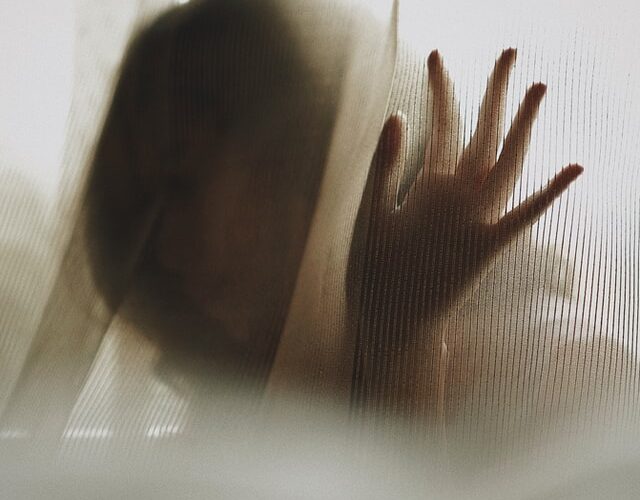Sarveswari Saikrishna | July 2022
Whenever they have a disagreement, the husband bangs the front door and leaves for the pub, because that is what he does. The wife disembowels a cupboard to clean it, because that is what she does. Nowadays, the house is always clean. The kitchen cabinets look organised to a fault, neatly lined with paper, condiments and spices arranged according to use and expiry date. The wardrobes are stacked in perfectly folded layers, an uneasy order to them. The bedroom is too neat, appears almost staged, the sheets crisp without a crease, as if it has never been used for the purpose it is meant. Today, after an hour of particularly harrowing fight, the wife is cleaning the already cleaned guest room closet.
She pulls out the linens and towels with the ferocity of a wounded animal, tears streaming, voice crackling. “All this mess, it needs straightening, it needs sorting,” she repeats to herself. On the mountain of soft towels and starched sheets, slides and falls, a shirt- a blue shirt, his shirt, not her husband’s. Within the safety of that locked room, she grabs a clutch full of him, his fabric, and breathes deep into it. It smells like past and mothballs. It has been a full seven years since they have last seen each other.
In that cheap hotel room, dirty yellow light and churning fan not affecting them, they cling to each other, naked, stripped of pretence, bare with agony, exhausted. They convince each other that it is for the greater good of the family, of the community. Their families are neighbours, friends even. Her mother sends the first box of gulab jamuns to his house on Diwalis. His father brings a specially made rumless, eggless plum cake to her house every Christmas. And they have been together, as long as they can remember, playing, studying and loving, together. Yes, their families are close.
In a hotel, far away from their small town, where they are nothing but a man and a woman, yearning for each other, soul and body, they discuss, debate and live through all their options. At the end of it, they discover they are not coward enough to die, nor are they bold enough to fight for their love. So they decide to let go, cleave themselves into two. They part with nothing to show for their exquisite sacrifice, except her scarf in his pocket and his blue shirt in her handbag.
The wife takes another whiff and searches for him in that blue shirt. But there is no trace of him. Now, all that remains in that shirt is regret, weighing her down, clutching her throat, squeezing her heart. Memories rush back, baying at her like a rogue animal, memories which she thinks she has successfully forced into a box and locked away.
She starts with the kitchen. Ceramic plates and tall glasses come crashing down, followed by the carefully curated pantry cupboard, each shattering with rambunctious clamour. The bedroom, filled with many fragile items and two delicate egos, receives her special wrath. She is blind with agony and breaks her reflection in the mirror. She picks up a glass shard and tears the sheets and pillows, in the bargain drawing her own blood. Red smudges trail wherever she goes, on the living room carpet, in the foyer, up the stairs, in the study. Books, her books, are peeled off their shelf, and thrown downstairs, where they lay among the red smudges like martyrs. There is no redemption to this. There will never be one.
The husband will discover her, several hours later, hysterical and inconsolable. He will hesitate for a second at the front door, and then, he will slam it again and leave for the pub, the second time in the day, because, “the woman has turned crazy.”
_________________________

Sarveswari Saikrishna is a short story writer, currently working towards her MFA Creative Writing degree from Writer’s Village University. Her stories are published in the literary magazines, TMYS and Third Lane. She was a finalist in the mentorship project offered by Writers Beyond Borders, and is proud to be a part of several anthologies published by Artoonsinn and Hive. She also has articles published in The Open Page, The Hindu, to her credit. Apart from literary magazines and anthologies, her stories are available in Artoonsinn website. She lives in Chennai with her family and dreams of a day when she can write without interruptions.
_________________________
Photo via Unsplash
Find The Mean Journal on Instagram @MeanPepperVine


